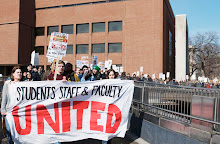Carl Elliott's new book, "White Coat, Black Hat: Adventures on the Dark Side of Medicine," was officially released yesterday. The book and the Mother Jones article (see previous post on this: http://umnfaculty.blogspot.com/2010/09/white-coat-black-hat-conflicts-of.html#links) are getting a lot of attention.
The Daily's editors wrote a short commentary on Dan Markingson's case. The editors note that "the case deserves continued public scrutiny, not only about the actions of the researchers carrying out the University’s mission, but about whether the University’s research mission itself favors public good over profit":
http://www.mndaily.com/2010/09/14/mary-weiss’-troubling-loss
The City Pages also published a brief interview with Elliott. When asked how his peers have reacted to his Mother Jones piece, Elliott answered, "Well, outside the medical school, and outside the university as a whole: lots of support for me personally, and, as you'd expect, shock that this could happen here. Inside the medical school: silence." Which may be because many in the medical school are lining their pockets with money from Big Pharma.
How could the U allows its employees to participate in projects that compromise its academic integrity? "You could ask the same question about any of a number of scandals at the university. A couple of years ago, the Star Tribune discovered that Leo Furcht, the co-chair of an ethics task force at the U working on a new conflict-of-interest policy, had steered a $501,000 pharma grant into a firm he owned and which he later sold for $9.5 million in stock. When the Star Tribune asked Deborah Powell, the dean of the medical school, why she had appointed Furcht to chair the ethics task force, she said it was because of his "extensive experience" devising conflict-of-interest rules. Furcht remains chair of the Department of Laboratory Medicine and Pathology." Ouch!
What about developing a stricter conflict of interest policy at the med school? "There are a few people concerned about conflicts of interest, but most of them seem afraid to say much. They prefer to keep their thoughts to themselves. As my brother says, "Doctors fear drug companies like bookies fear the mob."" It's time for faculty in other units to work in solidarity with those in the medical school that are concerned about the influence of corporate money on the academic integrity of our institution.
http://www.citypages.com/2010-09-15/news/lawyers-drugs-and-money/
Also see Elliott's interesting piece in the Chronicle of Higher Education about the pharmaceutical industry's use of influential physicians (often academic researchers) to give lectures, to conduct clinical trials, and to make presentations on their behalf at regulatory meetings or hearings.
http://chronicle.com/article/The-Secret-Lives-of-Big/124335/
Will the U respond with the usual legal-ese from the General Counsel or will it finally take steps to address the root problem?
Wednesday, September 15, 2010
Subscribe to:
Post Comments (Atom)


For those with the stomach, please see the following pieces in the Periodic Table:
ReplyDeleteConflict of Interest at U Medical School
http://ptable.blogspot.com/2008/12/conflict-of-interest-at-u-med-school.html
And also see the Star-Tribune account of the attempts by the Office of the General Counsel of the University of Minnesota to sweep this matter under the rug:
Openness and Transparency at the University of Minnesota
http://ptable.blogspot.com/2008/12/openness-and-transparency-at-university.html
Mr. Rotenberg and the President are setting a high standard for ethical behavior at the U of M.
In the words of President Bruininks:
"I think we need to put ourselves in the position of acting according to the highest ethical principles. I believe our people do that now and I believe our people will be doing that in the future as well." President Bruininks (Daily: 6-18-08)